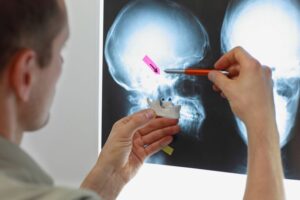
If you are dealing with symptoms like jaw pain, disordered breathing, and similar issues, you might wonder what treatments are available to help. In most cases, such issues can be addressed via non-invasive means, such as home remedies, routine dental treatment, or custom oral appliances. In certain circumstances, though, corrective jaw surgery might be the best option. What are some conditions that sometimes give rise to the need for this procedure? Continue reading below to find out.
Malocclusion
Malocclusion is a word that describes a misaligned bite. When the upper and lower teeth do not properly work together, they can cause pain and a range of other symptoms. Overbite and underbite are common types of malocclusions. In some cases, regular orthodontic treatment can correct a malocclusion. In other cases, surgery is necessary to realign the jaws so they can finally work in harmony.
Temporomandibular Joint Disorder (TMD)
Your temporomandibular joints (TMJs) are the joints that control the movement of your lower jaw. When they suffer damage, they can make it difficult for you to bite and chew. You may also experience limited jaw mobility, headaches, and other problematic issues. Conservative options are usually able to reduce the pain of TMD. However, surgery is necessary in certain cases to repair damage in the jaw joints.
Facial Asymmetry
It is very rare to come across someone who has a truly symmetrical face. The closer you look, the more you notice points of asymmetry. Some people, though, have very noticeable facial asymmetry. This can occur due to things like dental problems, genetics, or past injuries. In some instances, corrective jaw surgery can help to correct facial asymmetry and create a more pleasing appearance.
Sleep Apnea
Obstructive sleep apnea (OSA) is a disorder that causes repeated breathing disruptions during sleep. It can have devastating consequences for a person’s overall health and quality of life. Jaw abnormalities or misalignment may adversely affect the airway, worsening the condition. In most cases, CPAP therapy or a custom oral appliance provides adequate treatment. However, jaw surgery is sometimes necessary to bring about true and long-lasting improvements in nighttime breathing.
While any responsible practitioner will try to avoid surgery for their patients, it can be necessary sometimes. Corrective jaw procedures have the potential to accomplish wonderful things!
Meet the Practice
At Piney Point Oral & Maxillofacial Surgery of Katy/Cypress, our team works under the leadership of two skilled surgeons: Drs. Steve Koo and William Shepard. If you are wondering whether corrective jaw surgery might be necessary in your case, we are ready to answer your questions. To learn more about how we may be able to serve you, get in touch with our office at 832-353-1100.

